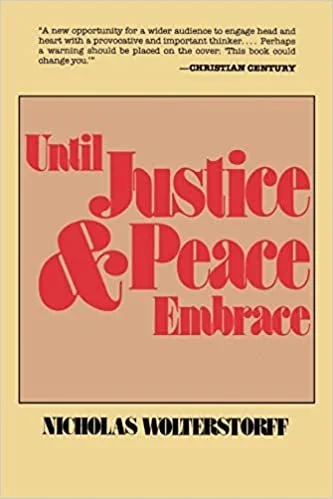Until Justice & Peace Embrace (Part 2)
Yesterday, in the first part of this series, I summarized Wolterstorff’s appropriation of the world-formative Reformed/neo-Calvinist tradition, how it is both similar to and different from the liberation theologies of Latin America, and how Scripture calls us to shalom — a world-formative vision related to, but beyond, both. Now for some of shalom’s ramifications, again in relatively bite-size chunks.
The rich & the poor
During the colonial era, Wolterstorff writes, it was the norm for Westerners to view poverty in other countries as “a natural condition for certain kinds of people.” After World War II, however, there was new-found excitement about the possibilities of development (the field of work, incidentally, to which I belong). Wolterstorff writes of that enthusiasm:
All that was needed was technology and capital; both of these could be painlessly supplied by us. A new self-serving explanation! But development has not occurred as we expected. The poor are with us in greater numbers than ever before. And now we can no longer ignore their existence.
So if not colonial feelings of superiority, nor naive enthusiasm about quick-fix solutions that don’t cost anyone anything, what does Wolterstorff propose? Well, first, he echoes the liberation theologians in saying that God has a special concern for the poor. To support this claim, he points to a series of passages from the Gospel of Luke (1:46-53; 4:16-21; 6:20-21; 7:18-23), and concludes with conviction but nuance:
If we consider Jesus to be God incarnate, and these teachings from the book of Luke to be God-authorized, as I certainly do, then we cannot but conclude that God has taken sides with the poor… On the other hand, the poor are not romaticized: they are not praised; they are blessed. And, yes, they can turn aside the blessing. Blessing is pronounced on those who hunger and thirst for righteousness. Not all the poor do so.
God-given rights
Scripture teaches that every human being is made in the image of God, and that’s what forms the basis for Wolterstorff’s insistence on affirming the rights of the poor. “I want to say, as emphatically as I can,” he writes, “that our concern with poverty is not an issue of generosity but of rights.” Therefore, if we don’t care about the poor, “we are violating the God-given rights of the poor person.” He goes into more detail about the definition of rights, and the duties that correlate to them, but in the interest of both time and space I won’t spell that out in detail here.
Nations & nationalism
If one desires to be an instrument of shalom, one must be concerned about the power of nationalism. Nationalism, Wolterstorff says, is basically “a nation’s preoccupation with its own nationhood.” A sense of woundedness, of having been wronged, is often at the root of a rise in nationalism. And it’s not long before that kind of nationalism becomes, as he puts it, cancerous:
When a nation suffers from nationalism unchecked, the life of its members is twisted and distorted, and the nation becomes a menace among nations because it accepts no standards for international peace and justice. It acts solely in its own self-interest, breaking treaties when it sees fit, waging wars when it finds the advantage, thumbing its nose at international conventions and organizations. National self-assertion is the only goal. All that restrains it is a balance of terror… We in our century have seen, and continue to see, that there is nothing more destructive of shalom than such nationalism.
But for Christians, the alternative is clear — or it should be:
What unites us as bearers of the image of God is more important than what divides us as members of nations.
I’ll have a third and final post in this series, probably next week, taking a look at Wolterstorff’s thoughts on what shalom looks like in a city; the relationship between justice and liturgy; and his call for scholars and academics to embrace the world-formative vision.
